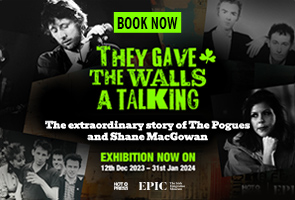David Fitzpatrick’s review(s)
Published in Issue 6 (November/December 2013), Letters, Volume 21 Sir,—David Fitzpatrick’s review (HI 21.5, Sept./Oct. 2013) of John Borgonovo’s Dynamics of War and Revolution: Cork City, 1916–18 devoted a paragraph to defending Peter Hart. The section contained a factual error: Hart’s The IRA and its Enemies (1998) did not assert that IRA commander Tom Barry engaged in ‘sectarianism’. It contained also a curiosity: Fitzpatrick cited the ‘albeit less rigorous’ Gerard Murphy on ‘evidence of brutal sectarian murders and sinister abductions’.
Sir,—David Fitzpatrick’s review (HI 21.5, Sept./Oct. 2013) of John Borgonovo’s Dynamics of War and Revolution: Cork City, 1916–18 devoted a paragraph to defending Peter Hart. The section contained a factual error: Hart’s The IRA and its Enemies (1998) did not assert that IRA commander Tom Barry engaged in ‘sectarianism’. It contained also a curiosity: Fitzpatrick cited the ‘albeit less rigorous’ Gerard Murphy on ‘evidence of brutal sectarian murders and sinister abductions’.
The latter observation substantially revises Fitzpatrick’s drb.ie review of Murphy’s The Year of Disappearances (2010), which described a ‘disorganised dossier’ by ‘an amateur enthusiast who intended to write a novel’. Fitzpatrick noted other reviewers (I was one, academia.edu) who ‘pointed out various errors of citation or misreading of documents’. He detailed examples of ‘loose argument and factual error’, including Murphy’s ludicrous suggestion that IRA spy Josephine O’Donoghue drowned Protestant boys. Fitzpatrick lamented ‘a major historical opportunity . . . squandered’.
The paragraph [in the HI review] concluded on critics of the approach adopted by Hart and Murphy: ‘apologists for contemporary republicanism have set out to discredit, sometimes by foul means as well as fair, the integrity of those [historians] denigrating [IRA] revolutionaries’. This view that Hart and Murphy are within a group engaged in denigration is interesting. Does this include Professor Fitzpatrick? Consider his performance at the 2013 Magdalene College Cambridge Parnell Lecture, entitled ‘The spectre of ethnic cleansing in Revolutionary Ireland’.
According to the Irish Sunday Times (Justine McCarthy, report, 17 Feb. 2013, letters 24 Feb.), Professor Fitzpatrick commenced by singing a ballad, A New Revenge for Skibbereen, to the tune of The Galtee Mountain Boy. Line two ran, ‘We took it out on the Protestants, we could only catch a few’, and continued in similar ethnic-cleansing vein. It depicted sectarian celebration of the killing of two Protestant men, Tom Bradfield, who was killed early in 1921, and ‘Old [Francis] Buttimer’ in April 1922. The ballad was perceived as the genuine republican article, as reflected in contributions following the lecture. However, Professor Fitzpatrick then observed that he did not wish to be accused, as Hart had been, of having ‘falsified historical evidence’. He admitted to composition ‘yesterday morning’.
The sadly ignored spoken part of the proceedings, on Methodist attitudes to the unfolding conflict, revealed no evidence of republican ethnic cleansing. The song, an example of denigration, was unsupported by historical research. Surely, then, allegedly foul and fair methods employed by unnamed republican apologists are offset by those Professor Fitzpatrick employed at a lecture series commemorating a Protestant leader of Irish nationalism.—Yours etc.,
NIALL MEEHAN
Griffith College
Sir,—In his review of John Borgonovo’s The dynamics of war and revolution: Cork City, 1916–1918 (HI 21.5, Sept./Oct. 2013) David Fitzpatrick refers to the period ‘before the toughs took over the show’. Does Prof. Fitzpatrick not realise that were it not for those same ‘toughs’, to whom he so disparagingly refers, who were prepared to fight and, if necessary, die for the cause in which they believed, Ireland would not have the freedom that it has enjoyed since 1923? Shame on him!—Yours etc.,
BRIAN Ó CINNEIDE
















